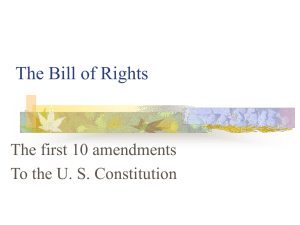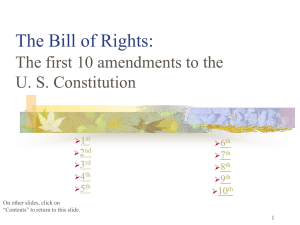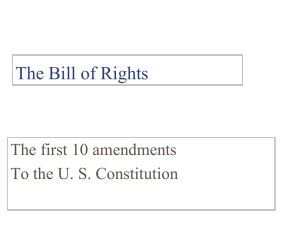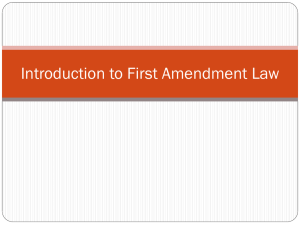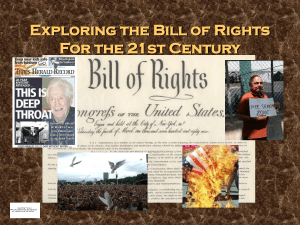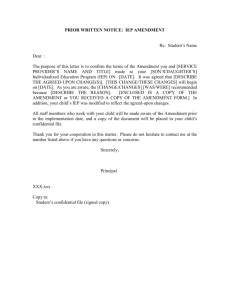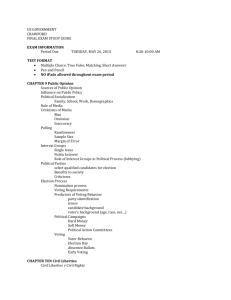The Bill of Rights The first 10 amendments The Bill of Rights The first
advertisement
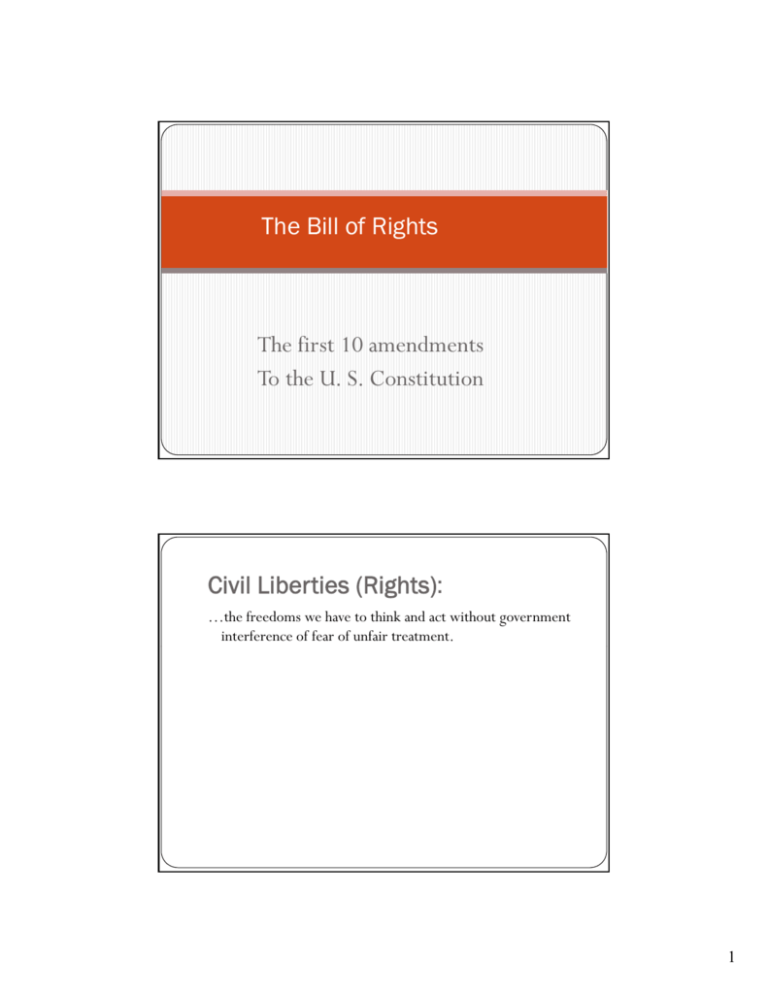
The Bill of Rights The first 10 amendments To the U. S. Constitution Civil Liberties (Rights): …the freedoms we have to think and act without government interference of fear of unfair treatment. 1 Who determines what the Bill of Rights mean? The Supreme Court makes rulings on the meaning The Supreme Court balances the rights of the individual with the needs of society Individual?? Society?? Who determines what the Bill of Rights mean? Example: p y However,, the The constitution does not address “privacy”. Supreme Court interprets Amendments 1, 4, 5 and 9 as supporting our right to privacy. ACLU (American Civil Liberties Union) – committed to protecting civil liberties. Criticized with being too political. http://www.aclu.org/pizza/ 2 The first amendment—5 rights mentioned Freedom F d off SSpeechh Freedom of Religion Freedom of the Press Freedom of Assembly Right to petition the governmentt Free speech– The individual can: Say any political belief Protest (without getting out of control) Say things about someone that are true Burn the flag Say racist and hate slogans Free speech means someone might say something you disagree with 3 Free speech—limits on the person Threaten to blow up airplanes, schools or the president Sexual harassment Create too much social chaos Extremely crude language in a public form Disrespectful, vulgar language in schools Hate crimes Freedom of Religion “Congress shall make no law respecting an establishment of religion or prohibiting the free exercise there of ” Two clauses: Establishment clause Free Exercise clause 4 Establishment and free exercise clause often conflict with each other In schools, the religion issue is most prevalent If a student raises his hand and says “teacher, can we say y an opening p g prayer p y before this test” If the teacher says: Yes”, It looks like establishment of religion No”, It is denying a student free exercise Establishment Clause—Government cannot promote religion 5 Establishment clause-Government Cannot Cans Teach about religions in school Allow voluntary prayer in many examples Transport students to a religious school Read R d Bibl Bible ffor culture lt or literary content Set a state religion Government cannot order a prayer Teach religious doctrine in the school Pay seminary teachers Teach creationism Free exercise of religion 6 Free Exercise—The person Can Cannot Choose whatever religion Break the law and claim it Lead a p prayer y in most is religious belief Raise children without education Deprive children of basic needs examples Ask questions about religions Worship who ever you want Freedom of speech “Congress shall make no laws . . . abridging the freedom of speech” 7 Freedom of the press Congress C shall h ll make k no llaw . . . abridging . . . the freedom of the press.” Freedom of the press-the press Can Cannot Print any political position Libel– intentionally Make fun of p people, p , injuring a person’s reputation by false facts Disclose defense-security secrets Detail how to make certain weapons especially politicians Expose wrongs by the government Say things you might not agree with 8 Freedom of Assembly Congress shall make no law . . . Abridging . . . The people to peaceably assemble” Freedom of Assembly--Individual Cannot Can Protest Parade (with a permit) Parade chanting hate slogans Gang members can congregate in public Protest by throwing rocks and breaking windows Hang out on private land against owners will loitering will—loitering Teen curfew 9 Petition the Government “Congress shall make no law . . . Abridging . . . the people. . . to petition the government for a redress of grievances” Petition the government You may sue the government for wrongs You cannot be p punished for exposing p g wrongs g byy the government The courts decide the wrongs 10 2nd Amendment—Right to bear arms “A well-regulated militia, being necessary to the security of a free state, the right of the people to bear arms shall not be infringed.” What is the debate with the right to bear arms? How much can the government keep guns from criminals and youth? In order to keep guns away from criminals, does that limit the right of law abiding citizens? 11 Gun debate continued Thousands Th d off people l die di every year because of guns Thousands of crimes are prevented because of guns Third Amendment The Th G Governmentt cannott force you to shelter soldiers in your home without your consent in time of war or peace. 12 Rights of the Accused Amendments #4-8 Important to preserve freedom Fourth Amendment “The The right of the people to be secure in their persons, houses, papers, and effects, against unreasonable searches and seizures, shall not be violated, and no warrants shall issue, but upon probable cause, supported by oath or affirmation, and particularly describing the pplace to be searched,, and the ppersons or things g to be seized.” 13 Fourth Amendment What does a policeman need in order to search your home? A warrant given to him by a judge. Search Warrant – a court order allowing law enforcement officers to search a suspect’s home or business and take specific items as evidence. Probable cause is also needed Fifth Amendment “No person shall be held to answer for a capital, or otherwise infamous crime, unless on a presentment or indictment of a grandd jury, except iin cases arising i i iin the h llandd or navall fforces, or in the militia, when in actual service in time of war or public danger; nor shall any person be subject for the same offense to be twice put in jeopardy of life or limb; nor shall be compelled in any criminal case to be a witness against himself, nor be deprived of life, liberty, or property, without due process of law; nor shall private property be taken for public use, use without just compensation.” 14 Fifth Amendment Indictment – formal charge by a group of citizens called a grand jury, who review the evidence against the accused. You cannot be tried for the same crime twice—called “Double Jeopardy” You do not have to testify against your self. “I plead the fifth” You must have due process of law before you are convicted Due Process – following established legal procedures Thee gove government e t cannot ca ot take ta e your you land a unless u ess itt pays. Eminent Domain – right of the government to take your public property for government use. Sixth Amendment “In allll criminal “I i i l prosecutions, ti th the accusedd shall h ll enjoy j the right to a speedy and public trial, by an impartial jury of the state and district wherein the crime shall have been committed, which district shall have been previously ascertained by law, and to be informed of the nature and cause of the accusation; to be confronted with the witnesses against him; to have compulsory process for obtaining witnesses in his favor, and to have the assistance of counsel for his defense.” 15 Sixth Amendment Right Ri ht tto speedy d trial t i l by b impartial i ti l jury—meaning j i nott favoring either side Why speedy? Why public? Need to be informed of charges Confront witnessed Present witnesses on your behalf Right to a lawyer – even if you cannot afford one Eighth Amendment “Excessive “E i bail b il shall h ll nott bbe required, nor excessive fines imposed, nor cruel and unusual punishments inflicted.” 16 Eighth Amendment No N excessive i bbailil No cruel and unusual punishment Prisoner kissing his Mom in prison 17
